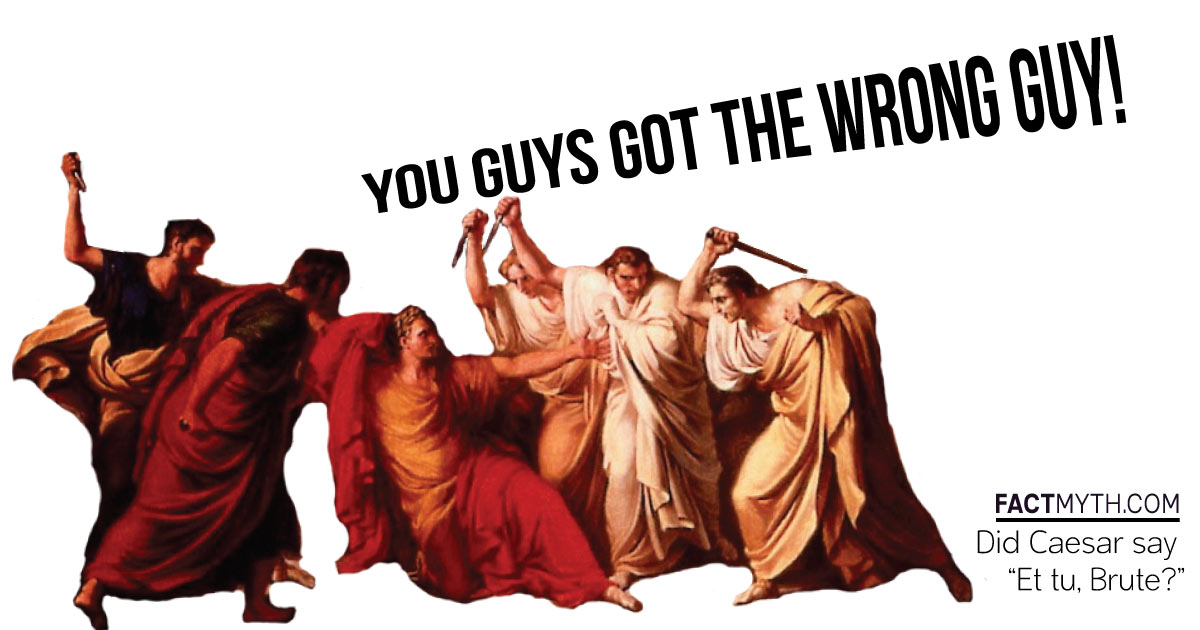It’s doubtful Julius Caesar would have said “Et tu, Brute?”. This is, at best, a mistranslation of the original Latin quote and probably a romanticized version of what actually happened. The oldest account of the incident that we have suggests that Caesar did not say anything at all. Let alone something witty and infamous. That credit probably belongs to the originator of this version of the quote, Shakespeare.
Caesar Said “Et tu, Brute?” myth

Did Caesar Actually Say, “Et tu, Brute?”
Evidence suggests Julius Caesar may have said a variation of the phrase, “Et tu, Brute?” preceding his assassination. However, the quote is from Shakespeare’s play “Julius Caesar”. It is very doubtful that Caesar said those exact words and historians debate that he said anything at all.
FACT: The version of the quote we know today is the result of “Roman”-ticizing the event and translation between languages over time.
What Does “Et tu, Brute?” Mean?
The phrase means “and you, Brutus?” or “also you, Brutus” and can be expressed as “even you, Brutus?” or “you, too, Brutus?”[1]
Why Did Caesar Say “Et tu, Brute?”
“Et tu, Brute?” in Shakespeare’s play “Julius Caesar” is a powerful line that expresses Caesar’s realization that even his close friend (and possibly real life son) Brutus had joined with the other senators in a conspiracy to kill him over his “king-like” behavior. Some think the quote is an expression of disbelief while others think it’s more of a curse (which happens to foreshadow the subsequent assassination of Brutus).
A video showing the story behind the Assassination of Julius Caesar.FACT: In the case of Roman kings “Caesar” isn’t his first name, it’s a translation of the word “king”. In other words, the empire once ruled by senators and democracy (of sorts), was now to be ruled by a dynasty of kings starting with the self-proclaimed “king-god” Julius Caesar. This is why the senators, along with Brutus, assassinated him. Contrary to what one might think, Caesar was popular and this move actually hastened Rome becoming a Monarchy.
What Did Caesar Actually Say?
In 119AD over 150 years after the assassination of Caesar in 44 BC, the Roman Suetonius wrote a variation of the quote in his book the twelve Caesars. Suetonius wrote the quote as “You too, my child?” (καὶ σὺ τέκνον—kai su, teknon).[2]
The Suetonius quote may be close to the original, or it may simply be another romanticized version of the event. In fact, Suetonius claimed that Caesar said nothing at his death and that he was simply writing down the quote that others had claimed to be said).
Why Was the Quote Changed?
It’s probable that the changing translation of an unwritten phrase over the years is the primary culprit behind the quote changing. Translators must pick the translation that best fits their time. The quote could have been reported accurately as heard, made up out of nothing, or misinterpreted along the way. Certainly Shakespeare used a variation of the quote, which borrowed from the language at the time. And today we change it once again and translate it as “and you, Brutus”.
FACT: Julius Caesar’s reign was followed by the reigns of Marcus Antonius (Mark Antony) and Augustus (Octavian). This interesting part of Roman history involves the first Caesar, the rise of the great general Mark Antony, the fall of Antony and Cleopatra (and Caesar’s and Cleopatra’s son), and the rise of Augustus. These events would shape the history of Rome and consequently western civilization.
- “Et tu, Brute?“. Wikipedia.org. Retrieved Jan 13, 2016.
- “The Twelve Caesars“. Wikipedia.org. Retrieved Jan 13, 2016.
- “Why did Shakespeare make Julius Caesar’s last words the Latin ‘Et tu, Brute?’“. Theguardian.com. Retrieved Jan 13, 2016.
- “ET TU BRUTE? NOT CAESAR’S LAST WORDS“. Todayifoundout.com. Retrieved Jan 13, 2016.
- “Augustus“. Wikipedia.org. Retrieved Jan 13, 2016.

laura Supports this as a Fact.
well duh